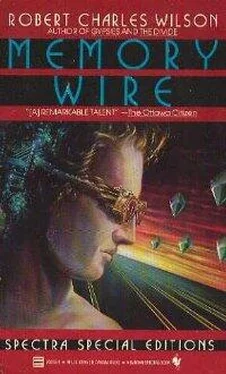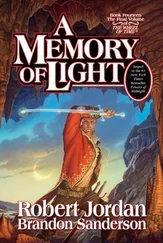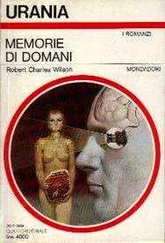Robert Wilson - Memory Wire
Здесь есть возможность читать онлайн «Robert Wilson - Memory Wire» весь текст электронной книги совершенно бесплатно (целиком полную версию без сокращений). В некоторых случаях можно слушать аудио, скачать через торрент в формате fb2 и присутствует краткое содержание. Год выпуска: 1987, ISBN: 1987, Издательство: Bantam Spectra, Жанр: Фантастика и фэнтези, на английском языке. Описание произведения, (предисловие) а так же отзывы посетителей доступны на портале библиотеки ЛибКат.
- Название:Memory Wire
- Автор:
- Издательство:Bantam Spectra
- Жанр:
- Год:1987
- ISBN:978-0-553-26853-9
- Рейтинг книги:4 / 5. Голосов: 1
-
Избранное:Добавить в избранное
- Отзывы:
-
Ваша оценка:
- 80
- 1
- 2
- 3
- 4
- 5
Memory Wire: краткое содержание, описание и аннотация
Предлагаем к чтению аннотацию, описание, краткое содержание или предисловие (зависит от того, что написал сам автор книги «Memory Wire»). Если вы не нашли необходимую информацию о книге — напишите в комментариях, мы постараемся отыскать её.
Memory Wire — читать онлайн бесплатно полную книгу (весь текст) целиком
Ниже представлен текст книги, разбитый по страницам. Система сохранения места последней прочитанной страницы, позволяет с удобством читать онлайн бесплатно книгу «Memory Wire», без необходимости каждый раз заново искать на чём Вы остановились. Поставьте закладку, и сможете в любой момент перейти на страницу, на которой закончили чтение.
Интервал:
Закладка:
Byron said slowly, as if the words had been drawn from some kiln inside him, “She’s on the pills again. She’s doing enkephalins, Ray. It’s a bad downhill road, and it will end with her dying unless we do something.” He looked at Keller; Keller was startled by the fierce, obvious pain in his expression. “Unless you do something.”
But that was impossible.
She couldn’t die.
She was here. She was all around him. She was video now. She was substantial.
She had only begun to exist.
Byron stood up.
He disliked this place where Keller was. It was a bad place, an Angel place, and it reminded him too much of the socket he used to wear. He had spent the war years in the same kind of wire daze Keller had entered now, the gauzy and pleasant territory of not-caring, which people like Keller rendered as “objectivity.” He understood the attraction, but it was the same attraction Teresa must feel for the pills: a surrender. He hated it especially because he wanted it. After all these years, he still had the taste for it.
But he had proved something today. It was maybe a hollow consolation, but he felt as if he had erased the Angel tattoo on his arm: if he looked for it, it would be gone. He had pleaded with Keller—who had become Teresa’s lover —to go back to her, and surely that was the last labor that was required of him… this pain, surely, was sufficient. He had done that for her, and there was no more he could do. He had earned his way into the world.
But she would die anyway, and that was the terrible thing, the irreducible thing, maybe the thing he wanted so desperately to hide from: you do everything you can, and sometimes the bad thing still happens.
“Listen,” Keller said suddenly, “you don’t have to leave. You—”
But it was pointless. They didn’t connect. Byron felt an abstracted pity for Keller, gaunt in his plush chair, hands poised over the faders. “It’s okay,” he said wearily. “Do what you need to do.”
Out in the world, the sun was terribly bright.
2. Keller was alone then.
Memories cascaded around him in cool crystalline light. Voices whispered.
One time, talking about Byron, Teresa had said, “He is the best of us.” Keller hadn’t understood. Now he felt a flicker of comprehension. But it was the kind of goodness he did not wholly understand, troubling and absolute. The old phrase echoed through him: When someone is hurting, you help. If it had been a video memory, he could have excised it, looped it out of existence; but it persisted, and it frightened him.
After a time he left the editing booth.
His hotel room faced one of the old suburban arteries, traffic noises all night and running water between ten and ten. He poured a drink, took a long shower, regarded himself in the mirror. His reflection—he considered it objectively —looked strung-out and haggard. His cheeks were sunken, his stubble unshaven. Who was this man? He looked like some wirehead. Some faded combat veteran dying in the Floats.
He closed his eyes.
In the night, drinking again, he called up Lee Anne, with whom he had once had a contract for affection: he recalled, with some fondness, the scent of her perfume. She appeared in the monitor as perfect as ever, stark in white makeup and her lips a piquant red. She peered at him coolly from the crystal display. Keller forced a smile. “We had a contract once,” he said. “You remember? We—”
But she shook her head. “I don’t know you,” she said.
The monitor went blank.
In the morning he was back in the booth.
It was almost unbearable. He winced away from the image of Pau Seco, the open oneirolith mine like a wound in the earth. It was all too vivid. He could smell the squalor of the old town, the dust, the stale heat. It was terrifying: it seemed about to rise from the monitors and surround him.
If someone is hurting, you help.
She was hurting, Byron had said. Keller circled the knowledge but dared not approach it. She was hurting. She was wounded. But the resonance was too terrible to acknowledge.
He hurried through the last of the editing. The print he delivered to Vasquez would be coldly objective, panoramic, a glimpse into the mechanics of the dreamstone trade, Pau Seco, SUDAM, the garimpeiros and the formigas, this last and strangest frontier. The rest—the merely personal —would be erased. Erased, it would in some important sense cease to exist. Erased, it would become bearable.
His hand was poised over an Editcommand when the door opened.
He swiveled on his chair, thinking it might be Byron again. He saw instead a carefully dressed man with receding hair and a generic smile. Some Network executive maybe. But the man stepped closer, and suddenly Keller could smell his mint-scented breath and feel a hint of his terrible and enormous hostility. The man was smiling even as his hands balled into fists. “My name is Oberg,” he said.
CHAPTER 23
Killing Keller would have been redundant, though in some fashion satisfying, and Oberg was practicing his best professional manners. A death in the Network compound would have alarmed too many people. So he had come prepared.
He struck Keller once; Keller fell to the floor, dazed. Quickly, Oberg bound Keller’s hands with tape and ran a strip of the same metallic tape across his mouth. Keller’s eyes were closed. The Angel blinded, he thought; the Angel silenced. He worked methodically now. He rolled Keller over and put a foot across the small part of his back, to immobilize him. From his hip pocket Oberg withdrew a miniature scalpel and a tiny pronged microchip.
He had purchased these things from a black-market neurotechnician working out of the Floats. The chip was a joywire chip, slightly modified. Attached to the socket behind Keller’s neck, it would pulse a voltage down Keller’s neural wiring, stimulating the reward centers in Keller’s brain. But Oberg had instructed the neurotechnician to substitute a more powerful voltage source.
“It’s insane,” the neurotech had told him. “You’d burn a man out. It would not be pleasure, it would be pain—immeasurable! And disorientation. And the victim —I can only say victim—would bum out in a matter of hours. Days, at most. He would proceed almost instantly to the last stages of wire psychosis. It would be murder.”
So of course Oberg had to pay extra.
He used the scalpel to pare away flesh from Keller’s socket. The socket had been opened recently, so this was relatively simple. He used a handkerchief to sponge away the blood. The socket gleamed beneath the derma, an oily coppery color. Keller had flinched from the pain of the cutting but was not yet fully awake. Oberg installed the joywire chip hastily but did not activate it.
He left Keller bound and turned to the memory editor.
It took him a few minutes to sort out Keller’s ordinances, isolate a moment of time. He hoped that what he wanted had not been erased. But it was the most recent layer of memory, intact, unedited. He accelerated the sampling rate and watched the monitor in front of him.
Time ran like water. Days flickered past. He would still the motion periodically, recognizing the docks at Belem, the air terminal, a flight to some tiny landing strip in Costa Rica; an ancient American jetliner arriving at the L. A. Harbor terminal. Faces and somatypes had been altered throughout, but he was able to identify Byron Ostler and Teresa Rafael by their repeated appearance in the trace. This was critical now: a shack in the Floats somewhere, cheap furniture and grimy windows; the place, Oberg assumed, where they had gone to ground. He followed the recording back to the mainland and then forward again, slowly, establishing the route. Somewhere in the North Floats. No real addresses amidst this twining of boat shanties and canals, but the route was simple enough to memorize. He did so.
Читать дальшеИнтервал:
Закладка:
Похожие книги на «Memory Wire»
Представляем Вашему вниманию похожие книги на «Memory Wire» списком для выбора. Мы отобрали схожую по названию и смыслу литературу в надежде предоставить читателям больше вариантов отыскать новые, интересные, ещё непрочитанные произведения.
Обсуждение, отзывы о книге «Memory Wire» и просто собственные мнения читателей. Оставьте ваши комментарии, напишите, что Вы думаете о произведении, его смысле или главных героях. Укажите что конкретно понравилось, а что нет, и почему Вы так считаете.












